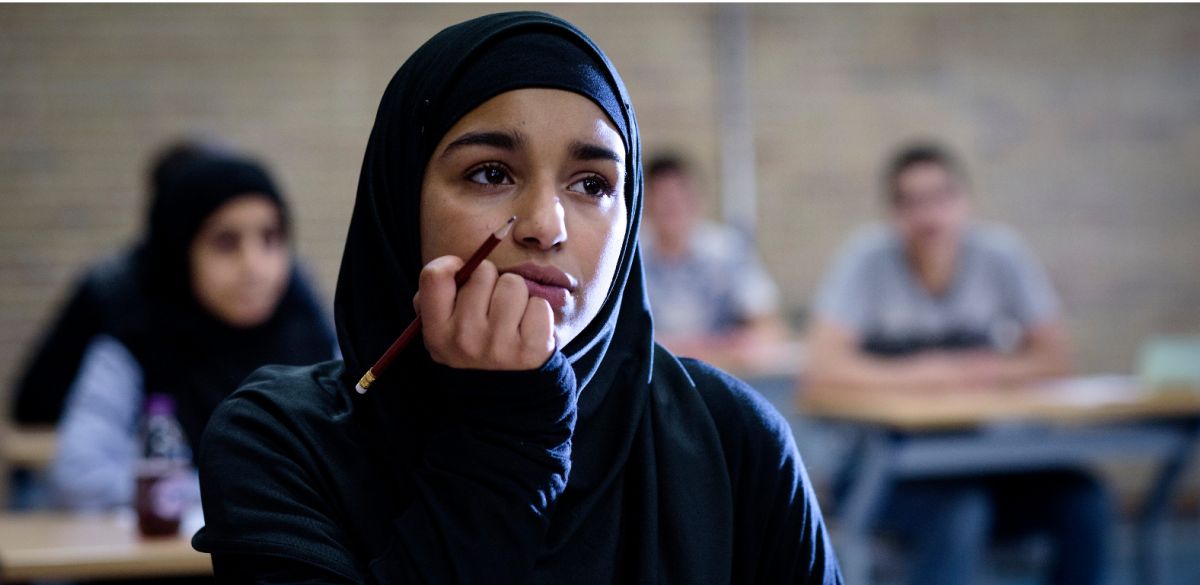Although it has been over five years since the film’s release, the subject matter of Layla M. has remained timely and can serve as an important starting point to further debate. The topics explored by the film, such as Islamophobia evidenced by the Burqa Ban in the Netherlands and the radicalisation of the Dutch Muslim women, are incredibly complex, but co-writer/director Mijke de Jong does not flee from the acute illustration of these intricacies.
Layla (Nora El Koussour) is a high school student with a Moroccan background in Amsterdam whose middle-class family hopes she will become a doctor. Islam does not seem to be an important aspect of the family’s life as they try to fit into the Dutch culture by conforming to the burqa ban that in 2016 was passed by the lower house of the States General (Tweede Kamer). Despite her parents’ apathy, Layla cannot conform to the law that alienates her further from the place she was born.

She chooses to fight against the discriminating rules by attending protests and engaging in activist action on the internet. The fact that her parents, especially her father (Mohammed Azzay), do not approve of her rebellion makes the girl even more eager to challenge the political system. She decides to secretly marry a jihadist, Abdel (Ilias Addab) met online and leave the country. Abdel’s main task is shooting and editing videos for radical Islamic groups, and the film’s cinematography seems to mirror the conventions of his semi-professional videos. We watch the action unravel through handheld, close shots, which make us feel more connected to the characters as we become a part of the film: we, the audience, are the camera partaking in the film’s events. We do not just observe but become engaged on a deeper level.
This religious aspect of the film, although prominent and crucial, is, however, not something that Layla really fights against throughout the narraive. The real enemy is the patriarchal domination that is a crux of every radical religious group. Moreover, this male tyranny stands in the centre of Western neoliberal capitalism, and it is no more or less oppressive than Islamic discrimination against women – it’s just different, with a divergent modus operandi.

This is where the real power of Mijke de Jong’s film lies: it doesn’t judge Layla for her choices or does not attempt to paint Islamic groups as the ultimate devil. Instead, it shows how the Western Islamophobic laws expose European democracies as backsliding into fascism. How little Dutch political system does in order for people from different backgrounds to feel like they are at home. As Layla admits in one of the scenes, she always needs to additionally explain herself when she states she comes from Amsterdam.
As a woman born in Poland who has spent the last 12 years in UK, I can relate to the pain of never being able to like home in a place you live in. Despite the fact that my skin colour conforms to British canon, my accent does not and I have to face the question of “where are you from” on daily basis. These questions alienate me by interfering with one of the aspects of my identity that is personal but also fluid and complex. I cannot imagine what women such Layla, born and raised in European countries but with Middle Eastern backgrounds, have to endure.

Layla M. is an essential film to watch as the Islamophobic laws spread through seemingly democratic European countries like a plague. For instance, the so-called Burqa Ban act that prohibits any face-covering clothing from being worn in public spaces came into force in the Netherlands in 2019. The backsliding of European democracies cannot herald anything positive, especially in the face of current Russian bio-politics. Layla M. can teach us to see the problems of Islamic radicalisation through different lenses, ones not built on fear of something we don’t understand. In fact, the European governments should focus their resources on assisting their citizens with understanding, and on helping people of all backgrounds to feel at home, free to express their religious beliefs without fear of bullying, discrimination, and hate.

